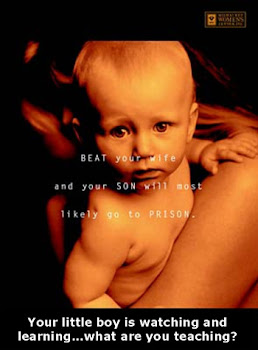The Batterer As Parent
by Lundy Bancroft
Research on children's exposure to domestic violence has tended to focus primarily on two aspects of their experience: the trauma of witnessing physical assaults against their mother, and the tension produced by living with a high level of conflict between their parents.1 However, these are just two elements of a much deeper problem pervading these children's daily life, which is that they are living with a batterer. The parenting of men who batterer exposes children to multiple potential sources of emotional and physical injury, most of which have not been recognized widely.
This article looks at the characteristics of men who batter and identifies ways in which these characteristics also influence their ability to parent appropriately. Additionally, the article will address the implications of such parenting for child protective and custody determinations.
Characteristics of Men Who Batter:
Most of the characteristics that are typical of men who batter have potential ramifications for children in the home. Batterers often tend toward authoritarian, neglectful, and verbally abusive child-rearing. The effects on the children of these and other parenting weaknesses may be intensified by the children's prior traumatic experience of witnessing violence. Consider the following selected examples of characteristics of men who batter.
Control:
Coerciveness is widely recognized as a central quality of battering men,4 and one of the areas of life heavily controlled by many men who batterer is the mother's parenting. A man who batters may cause or forbid his partner to terminate a pregnancy, overrule her parenting decisions, or assault her when he is angry over the children's behavior. Battered women are far more likely than other mothers to feel that they have to alter their parenting styles when their partners are present.
Entitlement:
A man who batters considers himself entitled to a special status within the family, with the right to use violence when he deems it necessary. This outlook of entitlement can lead to selfish and self-centered behavior on his part. For example, he may become irate or violent when he feels that his partner is paying more attention to the children than to him. It is difficult for children to have their needs met in such an atmosphere and they are vulnerable to role-reversal, where they are made to feel responsible to take care of the battering parent.
Possessiveness:
Men who batter often have been observed to perceive their partners as owned objects. This possessive outlook can sometimes extend to their children, partly accounting for the dramatically elevated rates of physical abuse and sexual abuse of children perpetrated by batterers, and for the fact that these men seek custody of their children more often than non-battering fathers do. Other characteristics that can have an important impact on children include
Manipulativeness:
Denial and minimization of the abuse
Battering in multiple relationships
Resistance to change.
Influence of Battering on Parenting:
The characteristics discussed above influence the parenting of men who batter and have a negative impact on the children by:
Creating role models that perpetuate the violence
Undermining the mother's authority
Retaliating against the mother for her efforts to protect the children
Sowing divisions within the family
Using the children as weapons against the mother
Creating role models that perpetuate the violence:
Boys who are exposed to domestic violence show dramatically elevated rates of battering their own partners as adolescents or adults. Research suggests that this connection is a product more of the values and attitudes that boys learn from witnessing battering behavior than of the emotional trauma of being exposed to such abuse Daughters of battered women show increased difficulty in escaping partner abuse in their adult relationships Both boys and girls have been observed to accept various aspects of the batterer's belief-system, including the view that victims of violence are to blame, that women exaggerate hysterically when they report abuse, and that males are superior to females.
Undermining the mother's authority:
Domestic violence is inherently destructive to maternal authority because the batterer's verbal abuse and violence provide a model for children of contemptuous and aggressive behavior toward their mother.
The predictable result, confirmed by many studies, is that children of battered women have increased rates of violence and disobedience toward their mothers.
Some battered mothers make reports of being prevented from picking up a crying infant or from assisting a frightened or injured child and of being barred from providing other basic physical, emotional, or even medical care. Interference of this kind can cause the children to feel that their mother does not care about them or is unreliable. The batterer may reinforce those feelings by verbally conditioning the children through statements such as, "Your mother doesn't love you," or, "Mommy only cares about herself."
Retaliating against her for her efforts to protect the children:
A mother may find that she is assaulted or intimidated if she attempts to prevent the batterer from mistreating the children, or may find that he harms the children more seriously to punish her for standing up for them. Therefore, she may be forced over time to stop intervening on her children's behalf. This dynamic can lead children to perceive their mother as uncaring about the batterer's mistreatment of them, and can contribute to her being labeled by child protective services as "failing to protect."
Sowing divisions with the family:
Some batterers use favoritism to build a special relationship with one child in the family. As some researchers have noted, the favored child is particularly likely to be a boy, and the batterer may bond with him partly through encouraging a sense of superiority to females. Batterers also may create or feed familial tensions deliberately. These manipulative behaviors are a likely factor in the high rate of inter-sibling conflict and violence observed in families exposed to battering behavior.
Using the children as weapons:
Many men who batter use children as a vehicle to harm or control the mother through such tactics as
destroying the children's belongings to punish the mothe.r
Requiring the children to monitor and report on their mother's activities.
Threatening to kidnap or take custody of the children if the mother attempts to end the relationship.
These parenting behaviors draw the children into the abuser's behavior pattern. Post-separation, many batterers use unsupervised visitation as an opportunity to further abuse the mother through the children.
Implications for Child Protective and Custody Determinations
Determinations regarding child protection, custody, and visitation in the context of domestic violence:
Be informed by an awareness of the destructive parenting behaviors exhibited by many men who batter, and their effects on children and their mothers. These behaviors have especially important implications for children who are struggling with two sets of psychological injuries, one from exposure to the battering behavior and the other from their parents' divorce or separation.
Some elements to examine closely when crafting interventions for families include:
Addressing the healing needs of children: There is a wide consensus that children's recovery from exposure to domestic violence (and from divorce) depends largely on the quality of their relationship with the non-battering parent and with their siblings. Therefore, in addition to safety consideration, court determinations should take into account whether the batterer is likely, based on his past and current behavior, to continue to undermine the mother's authority, interfere with mother-child relationships, or cause tensions between siblings. Because children need a sense of safety in order to heal juvenile and family court decisions may not want to include leaving the children in the unsupervised care of a man whose violent tendencies they have witnessed, even if they feel a strong bond of affection for him.
Making appropriate assessments, especially in custody determinations:
A batterer's history of abusive behavior, and how such abuse reflects on his parenting, needs to be investigated carefully, assessing for the presence of any of the common problems described above and paying particular attention to that children may become a vehicle for continued abuse of the mother.
Courts need to ensure that custody evaluators have extensive training on the multiple sources of risk to children from custody or unsupervised contact with the abusive parent.
Safely fostering father-child relationships:
Except in cases where the children are terrified of the battering parent or have been abused by him directly, children tend to desire some degree of ongoing contact with their fathers. Such contact can be beneficial as long as adequate safety measures are provided for the mother and children and the abuser is not given the opportunity to cause set-backs to the children's emotional recovery. These goals can be fostered through custody arrangements that take into full consideration the violence in the home caused by the battering parent and through the use of professionally supervised visitation, ideally based in a visitation center. Where unsupervised visitation is found to be safe, the use of relatively short visits that do not include overnight visits can reduce the batterer's ability to damage mother-child relationship, limit his negative influence on the children's behavior and value-systems, and ensure that the children feel safe and secure,while still allowing them to feel a continued connection to their father.
The Batterer As Parent, by Lundy Bancroft
http://www.volcanopress.com/
Sunday, August 15, 2010
Subscribe to:
Post Comments (Atom)
Children Learn What They Live







1 comment:
hey your blog design is very nice, neat and fresh and with updated content, make people feel peace and I always enjoy browsing your site.
- Thomas
Post a Comment